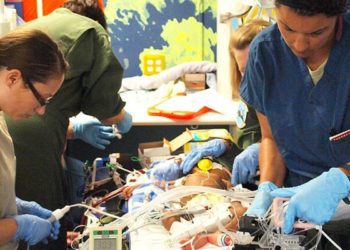Prostacyclin therapy may decrease extracorporeal life support use in neonates with congenital diaphragmatic hernia
1. In a cohort of about 6,000 patients with congenital diaphragmatic hernia (CDH), treatment of pulmonary hypertension with prostacyclins in the first 7 days of life was associated with significantly decreased odds of later requiring extracorporeal life support (ECLS).
2. Prostacyclin use was also associated with decreased ECLS duration.
Evidence Rating Level: 2 (Good)
Study Rundown: Congenital diaphragmatic hernia (CDH) interrupts lung development and can necessitate the use of extracorporeal life support (ECLS), or extracorporeal membrane oxygenation, which is associated with increased morbidity and mortality, in the neonatal period. Among other vasodilating agents, prostacyclins have been used to reduce pulmonary arterial hypertension in infants with CDH. This study aimed to assess the effectiveness of prostacyclin therapy in avoiding ECLS use in this population. The entire cohort included about 200 patients who received prostacyclins and 6,000 who did not; from this cohort, 147 patients from each group were propensity-matched. In the matched analysis, 23.3% of patients receiving prostacyclins went on to receive ECLS compared to 42.9% of those who had not received prostacyclins, indicating that prostacyclin therapy in the first 7 days of life was significantly associated with reduced ECLS use. ECLS duration was also significantly shorter in the prostacyclin group. However, prostacyclin use was associated with a higher adjusted in-hospital mortality rate in the entire cohort, though not in the matched analysis. Past small studies on prostacyclins for pulmonary hypertension due to CDH were equivocal, but prostacyclins are currently in common use for CDH, including at a majority of the included centers. This cohort study uses multiple analyses to provide compelling evidence of a benefit of early prostacyclin therapy in avoiding the need for ECLS in patients with CDH. The finding of increased mortality in the unmatched cohort likely reflects higher CDH severity in the group receiving prostacyclins. Prospective, controlled studies are needed to further elucidate the efficacy of this therapy.
Click to read the study in JAMA Pediatrics
Relevant Reading: Congenital diaphragmatic hernia
In-Depth [retrospective cohort]: Study data were drawn from the international CDH Study Group registry reflecting 90 medical centers. Neonates admitted within one week of birth between 2007 and 2019 were included. Those who received a prostacyclin within 7 days of life were considered to be exposed to early prostacyclin therapy. Infants receiving prostacyclins only after initiation of ECLS were considered unexposed. Propensity score matching was performed using gestational age, birth weight, Apgar scores at 1 and 5 minutes, maximal and minimal partial pressure of carbon dioxide on the first day of life, study center, and severity of pulmonary hypertension. Pulmonary hypertension severity was determined based on the first echocardiogram after birth. In a multivariable mixed-effects analysis of the entire cohort, early prostacyclins were associated with decreased odds of requiring ECLS, with an adjusted odds ratio (aOR) of 0.60 and 95% confidence interval (CI) of 0.37-0.96. In the matched analysis, prostacyclin use was again associated with decreased odds of ECLS (aOR 0.39, 95% CI 0.22-0.68), as well as decreased ECLS duration, with a mean duration of 8.6 and 12.6 days in the exposed and unexposed groups, respectively.
Image: PD
©2023 2 Minute Medicine, Inc. All rights reserved. No works may be reproduced without expressed written consent from 2 Minute Medicine, Inc. Inquire about licensing here. No article should be construed as medical advice and is not intended as such by the authors or by 2 Minute Medicine, Inc.









